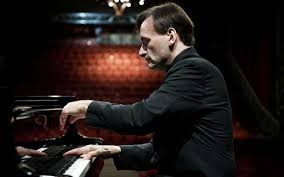Glyndebourne Opera House, 3 May 2015
A Glyndebourne matinee has become something of a tradition over recent years and Stephen Hough’s recital of Debussy and Chopin proved to be a perfect start for the classical concerts in this year’s festival.
At the heart of the recital were Chopin’s four Ballades, neatly sandwiched between shorter pieces by Debussy, opening with La plus que lente. With the Steinway on the apron in front of the safety curtain the sound was immediate and very bright, allowing the quietest of tones to be heard easily. Stephen Hough made much of this with the delicacy of his touch and the tenderness with which he seemed to ease the music into the auditorium. The simplicity, almost naivety, of Pagodes gave way to the lilting fluidity of La soiree dans Grenade and the heavy staccato in Jardin sous la pluie.
The Ballades opened with the second in F major, and Stephen Hough produced ferocious contrasts from the gentle lilt of the opening to the massive intensity of later passages, but all without any loss of clarity, and leading to a heady enthusiastic climax.
The tentative opening of the first Ballade allowed its lyrical qualities to unfold gently, building into inevitable waves of sound, the articulation always impeccably clear.
After the interval which allowed for a brief stroll around the gardens – though the mist totally enshrouded the downs – we returned for the third and fourth Ballades. I wonder how many, like myself, recall the Ab major Ballade from O level music so very many years ago? Here the contrasts which underpin the structure were beautifully found with the same tentative grace which we had experienced before the interval. The same sense of introspection is there at the start of the fourth Ballade until the work builds to its raging conclusion. Stephen Hough not only manages to see the works as a whole but brings a sense of improvisatory tension as if they are unfolding for the first time even as we hear them.
If Debussy’e Children’s Corner does not have quite the dramatic intensity of the Chopin the individual pieces were delightfully crafted, the Serenade having a wistful quality before the swagger of Golliwogg’s Cakewalk.
The final L’isle joyeuse was infused with light and hedonistic joy.
There were four encores – and we could easily have stayed for more. The first, almost conventionally, was a Chopin Nocturne, but we rapidly moved to lighter pieces by Minkus and Mompou, concluding with Young Girls in the Garden – a fitting ending for a glorious afternoon.

